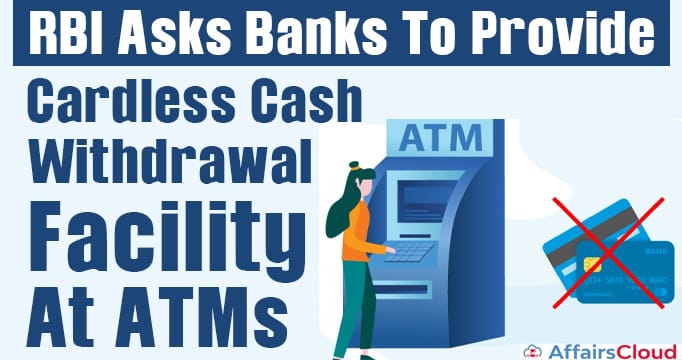
The Reserve Bank of India (RBI) asked banks to provide the option of Interoperable Card-less Cash Withdrawal (ICCW) at their ATMs (Automated Teller Machines) in order to curb frauds like skimming, card cloning and device tampering.
- This directive is issued under Section 10(2) read with Section 18 of the Payment and Settlement Systems Act, 2007 (Act 51 of 2007).
Key Points:
i.For this ICCW, RBI also advises National Payments Corporation of India (NPCI) to facilitate Unified Payments Interface (UPI) integration with all banks and ATM networks.
- UPI would be used for customer authorization in such transactions.
- The settlement will be made through the National Financial Switch (NFS) / ATM networks.
ii.Withdrawal limits for ICCW transactions will be in line with the limits for regular on-us/off-us ATM withdrawals.
iii.All other instructions related to harmonization of turnaround time (TAT) and customer compensation for failed transactions will continue to be applicable.
RBI allows exporters to settle trade transactions with Sri Lanka in INR
In another circular, which has been issued by RBI under sections 10(4) and 11(1) of the Foreign Exchange Management Act (FEMA), 1999 (42 of 1999) has allowed exporters to settle trade transactions with Sri Lanka in Indian Rupee (INR) outside the Asian Clearing Union (ACU) mechanism.
- This decision has been taken amid view of difficulties being faced by exporters in receipt of export proceeds from Sri Lanka and State Bank of India’s (SBI) credit facility.
- Under the arrangement, financing of export of eligible goods and services from India will be allowed subject to their being eligible for export under the Foreign Trade Policy of the Government of India and whose purchase is agreed to be financed by SBI under this agreement.
Background:
In March, 2022, the government had guaranteed a term loan of USD 1 billion extended by SBI to Sri Lanka for financing purchase of essential goods from India.
- Sri Lanka is facing its worst economic crisis since gaining independence from Britain in 1948 due to lack of foreign currency, which means the country cannot afford to pay for imports of staple foods and fuel, leading to acute shortages and very high prices.




